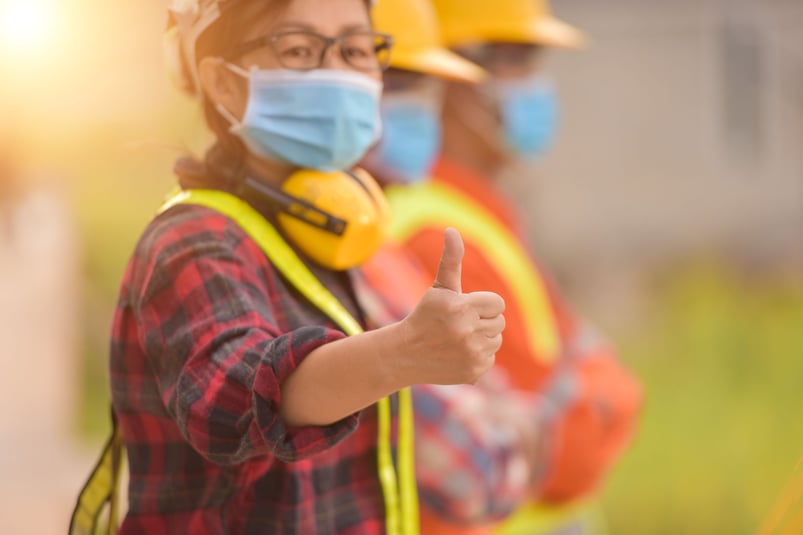
B.C. pubic health order addresses the rapid increase in COVID-19 cases among workers employed in large-scale projects
As COVID-19 case numbers continue to climb across the country, British Columbia is taking action to address outbreaks in the province’s large-scale industrial worksites and work camps near Indigenous communities. Dr. Bonnie Henry, B.C.’s Provincial Health Officer, has issued a public health order that has B.C.’s major industrial projects sending workers home. This intervention may have implications for similar major industrial projects in other jurisdictions.
Issued on December 29,, 2020, the B.C. order addresses the rapid increase in COVID-19 cases in the Northern Health Authority region among workers employed in large-scale projects. Because of the nature of these projects, there have been outbreaks of COVID-19 in the work camps as well as the transmission of the virus to surrounding communities, including Indigenous communities where many community members and businesses are deeply involved in major projects.
The order recognizes the health hazards associated with the presence of large numbers of workers at worksites and camps: there is an immediate need to take action to reduce the rate of transmission of COVID-19 in these areas. In response, the number of workers present onsite have been reduced to baseline numbers with specific guidelines in place for the incremental increase in staffing.
What does this mean for Indigenous Communities?
Large-scale industrial projects have not been paused by the pandemic — work continues across the country with Indigenous community members and businesses providing support, especially where Impact Benefit Agreements are in place. The public health order issued in BC is a shining example of what can and should be done to protect the health of workers and the health of those living in the communities that surround these projects, but more can be done.
The spread of COVID-19 is far from contained. Indigenous communities will continue to experience an increased risk of hospitalizations, ICU admissions, and deaths related to the spread of the virus from nearby worksites and work camps. Formal recognition has been given to the health risks experienced by communities living alongside large-scale projects, adding volume and strength to the voices advocating for protection. This is an opportunity for Indigenous communities to raise their concerns and advocate for similar orders and protection measures to be put in place in other provinces and territories.
We assert that all companies advancing major projects while COVID-19 remains active should, at a minimum, prioritize these four actions:
- Funding Rapid COVID-19 Testing – supporting communities and worksites
- Funding COVID-19 community relief supplies (e.g., non-perishable foods, high-quality masks, high-quality hand sanitizer, and other PPE - especially from Indigenous manufacturers - e.g. Dent-X Canada - and Indigenous distributors - e.g. Biinad) and provide support for community-driven preventative measures
- Work with all levels of governments to amplify Indigenous voices to prioritize government attention to Indigenous community needs of all kinds during COVID-19, but especially for vaccination programs
- Affirming — or re-affirming — wider company commitments and policies for working in collaboration with Indigenous communities to support and enhance community well-being, including “clean air, regenerative wild fisheries and forests, socially healthy families, the passing down of cultural values, excellent education, respect for traditions that values Elders and living Indigenous knowledge, a responsive health-care system and a natural environment that sustains our collective – Indigenous and non-Indigenous – well-being” (– “Time to add First Nations’ imperatives to an alternative GDP index” - Mark Podlasly director of economic policy and initiatives at the First Nations Major Project Coalition and a member of the Nlaka’pamux Nation)
Work on these projects will carry on, in one form or another, and communities must manage the risks, and look to ways to improve and enhance future wellbeing and resilience. Both project- and community-specific actions are needed to manage the spread of the virus, including advocating for strong workplace COVID-19 prevention programs, rapid testing capabilities for both worksites and communities, and vaccination programs.
As all eyes watch how the impacts of the order play out in B.C., it is an opportunity for Indigenous communities to advocate for risk mitigation and prevention strategies in their own Territories.
For more information on communication resources for your community, check out this handy toolkit.
Like what you are reading? Sign up for our biweekly news digest:
About Us: Shared Value Solutions
Shared Value Solutions is an environmental and community development consulting firmwith staff serving First Nation, Métis and Inuit Nations from coast, to coast, to coast.
Our team works alongside Indigenous Nations across Canada, providing technical guidance, regulatory advice, peer reviews, planning, and negotiation strategy in relation to major resource development projects.
And is it ever exciting!
- Impact Benefit Agreement Negotiation Support
- Technical Reviews and Regulatory Process Support
- Community and Economic Development Planning
- Indigenous Knowledge and Land Use Studies
- Environmental Monitoring
- Guardians Program Development
- Climate Change Readiness
- GIS and Mapping
- and a whole lot more...www.sharedvaluesolutions.com
Submit a Comment

